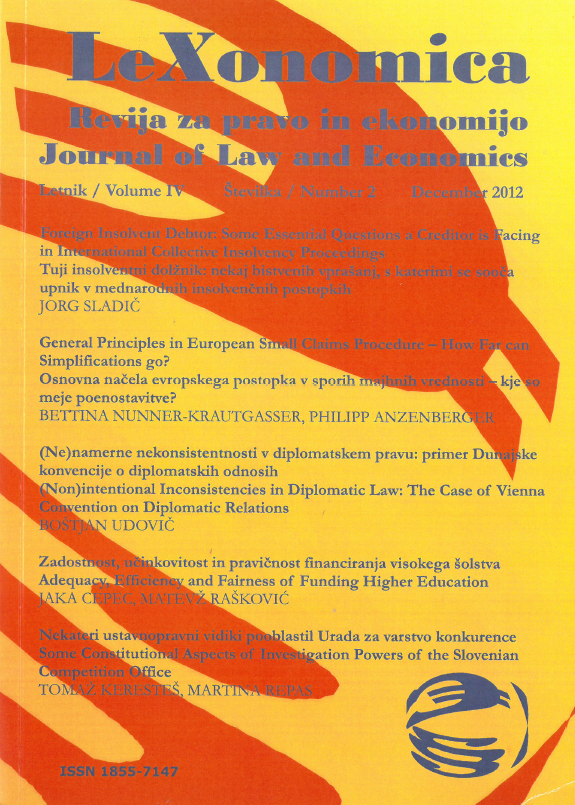Foreign Insolvent Debtor: Some Essential Questions a Creditor is Facing in International Collective Insolvency Proceedings
Keywords:
private international law, insolvency law, principle of territoriality, principle of universality, principle of single universal assets and property, recognition of decisions of foreign courts rendered in collective insolvency proceedings, recognition of effects of a foreign collective insolvency proceedings, centre of main interestsAbstract
Creditors in international trade are often faced with issues of an insolvent foreign debtor who often has property and assets in several states. In such a case creditors are faced with difficulties of international collective insolvency proceedings. The introductory parts of the article examines the standard questions like the question of a single, universal property of an individual or legal person and on the other hand the principles of territoriality and universality in public international law as far as the effects of foreign collective insolvency proceedings are concerned. The article then deals with issues of the centre of main interests as the point of contact and issues opened with the application of the lex concursus.
Tuji insolventni dolžnik: nekaj bistvenih vprašanj, s katerimi se sooča upnik v mednarodnih insolvenčnih postopkih. V mednarodni trgovini se upniki dostikrat soočijo z vprašanjem stečaja svojih dolžnikov v tujini, ki imajo večkrat premoženje tudi v različnih državah. V takšnem primeru so upniki soočeni s težavnostjo mednarodnega stečaja. Uvodoma članek obdela standardna vprašanja, kot je na eni strani zasebnopravna teorija enotnosti premoženja in na drugi strani mednarodno pravni načeli teritorialnosti in univerzalnosti učinkov stečaja v tujini. Nato pa se ukvarja z vprašanjem središča glavnih interesov in pojmom lex concursus vmednarodnih stečajnih postopkih.
Downloads
References
Audit, B. (2008) Droit international privé (Paris: Economica).
Bork, R. (2009) Einführung in das Insolvenzrecht (Tübingen: J. C. B. Mohr).
Kastrinou A. (2009) European Corporate Insolvency Law: an Analysis of the Corporate Rescue Laws of France, Greece and the United Kingdom, Thesis at the University of Leicester.
Lapajne, S. (1929) Mednarodno in medpokrajinsko zasebno pravo Kraljevine Srbov, Hrvatov in Slovencev (Ljubljana: Tiskovna zadruga).
Larenz, K., Wolf, D. (2004) Allgemeiner Teil des Bürgerlichen Rechts (Munich: C. H. Beck).
Neuroni, E., Naef, F. (2008) Droit suisse de la faillite internationale: la faillite d'un système, Aktuelle juristische Praxis, 11, 1396–1412.
Pastor Ridruejo, J. A. (1971) La faillite en droit international privé, Recueil des cours de l'Academie de droit international, 133 II, p. 135–222.
Paulus, Ch. G. (2006) Die ersten Jahre mit der Europäischen Insolvenzverordnung, RabelsZ 70, p. 458–473.
Schmidt, K. (2010) Ein gesetzlicher „Konzerngerichtsstand“ im Insolvenzrecht in: Berger, Ch., Kayser, G., Pannen, K., Sanierung, Insolvenz, Berufsrecht der Rechtsanwälet und Notare (Munich: C. H. Beck).
Volken, P. (1993) L'harmonisation du droit international privé de la faillite, Recueil des cours de l'Academie de droit international, 230, p. 343–432.
Downloads
Published
Issue
Section
License
© Univerza v Mariboru, Pravna fakulteta, Univerzitetna založba
Prosti pristop
